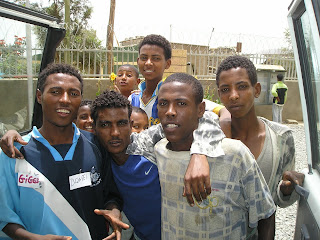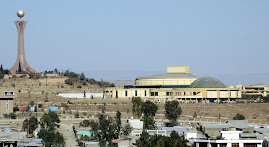The last week has been packed full of interesting trips. I’ve been to the countryside to see some rural development projects, visited the houses of some of my students, and have had a trip to Mek’ele’s monument. There’s a lot to tell you all...
 After School Visits
After School Visits – Whilst I’ve had plenty of time to get to know my students in the school setting, it’s clear that I’m not seeing the whole picture. The children all come from difficult backgrounds, and yet the school does its best to provide most things for the children within its walls. Thus, after lessons I’ve taken the time to visit the homes of two of my students. The living conditions are very basic (often there are no tables or chairs, and the only form of cooking equipment is a charcoal burner), and the families all seem to live in very cramped spaces.

However, everyone is extremely generous – as soon as I walk through the door I’m sat down and a “coffee ceremony” begins... The ceremony starts with the women roasting coffee beans. Once roasted, the smoky beans are passed under the noses of all present, to ensure everyone appreciates the aroma. After this, the beans are hand ground and then put into boiling water. The result is a lovely, strong coffee (even I, someone who usually shies away from coffee, like it). The coffee is given to the guests, and then incense is lit. This invariably leads to the small single-roomed house becoming engulfed in smoke, but it’s all very lovely! The women of the house will then patiently wait for the guest to say “tuum boona” (“nice coffee”), before they can relax and get back to their regular duties. Coffee ceremonies seem to be a big part of Ethiopian culture, and I’ve certainly enjoyed the chance to get to know families during these coffee-fuelled events.

I’ve been able to visit the students in a home environment mainly due to the work of the Aba Gabremichael Project. The project has meant that the vast majority of the students no longer live on the streets, with most being reconnected with their relatives, or given temporary accommodation at the school. However, there is one group of orphans who have taken matters into their own hands, and are renting a single roomed mud house close to the school. Seven teenage boys live in what they call the “San Siro”, and they have made the place their own – the walls are a bizarre collage of posters of footballers, scantily-clad women and religious icons! They all seem well organised and happy, and support each other very well.
 Visit to Mai Zeg Zeg
Visit to Mai Zeg Zeg – On Friday the 31st we were very kindly invited to see some of the projects run by the regional Catholic authorities. The vast majority of the day was spent going to see the Mai Zeg Zeg (Spiralling Water) project, which was nothing short of astounding – a word which I don’t use lightly. The project has focused on improving the lives of the people in one rural area outside of Mek’ele. Its primary focus has been on developing the agriculture of the region through the use of water management techniques. The result is that the whole area is green and fertile! This is in stark contrast to the area outside of the project boundary, which is dry and arid. The difference is striking – it’s rare to see the benefits of a project so visually. Needless to say, the locals now have a steady flow of food and income, and their future looks brighter. The project has been such a success that the prime minister of Ethiopia visited it himself recently. It just shows that with a little bit of aid and expertise from charitable agencies, local people can really achieve great things.
 Mekele’s Monument
Mekele’s Monument – as soon as you enter the city of Mek’ele, you are confronted by a gigantic pillar. Apart from being a very striking part of the skyline, it also has a special place in the hearts of the local Tigrian people. The monument commemorates the role that the Tigrian People’s Liberation Army had in freeing the nation from the tyranny of the DERG regime. The DERG? Just from the name you can tell that this is an unpleasant organisation! The DERG ruled Ethiopia for over 25 years (between 1976 and 1992), and from what I can tell seemed to inflict a lot of pain and suffering upon the Ethiopian people. Whilst calling itself a socialist regime (mainly to ensure that it got weapons from the USSR) it did little for the poor, and brutally clamped down on any opposition groups.

One of the best parts of the monument is found at its base. Amongst various statues is that of Desalegn, a mule who famously transported arms and supplies through enemy lines. Desalegn’s crucial covert activities helped ensure that the Tigrian rebels had the necessary tools to take the fight to the DERG! Today, the former rebels hold key posts in the national government, and seem to be doing a good job in pushing Ethiopia’s development forwards (that is at least what people from national and international aid agencies have told me).
Just one more week to go before my departure from Mek’ele, and I’ve got a lot to fit in. Our last day of teaching is Thursday, so I’ll be spending my time trying to round off the classes and organising an “end of term” trip to a nearby waterfall. On Friday we’ll be off for two days to Alitena (a town further north), and then we’ll make a tearful farewell on Monday the 17th. Expect an update shortly afterwards. For now though, a big Tigrian hug to you all,
Robert








































